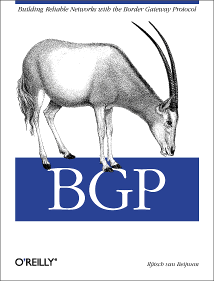
|

|

|
|
Home ·
BGP Expert Test ·
What is BGP? ·
BGP Vendors ·
Links ·
Archives ·
Books ·
My New BGP Book | ||
 (advertisement)
(advertisement)
| ||
|
White House National Strategy to Secure Cyberspace draft (posted 2002-10-28)
At the end of September, the White House published a National Strategy to Secure Cyberspace. It seems that at the last moment, a lot of text was cut and the 60 odd pages PDF document offered for download was made a draft, with the government actively soliciting comments. One of the prime recommendations in the document is:
Some people say the government wants Secure BGP (S-BGP) to be adopted. It is unclear how reliable these claims are. In any event, S-BGP has been a draft for two years, with no sign of becoming an RFC or implementations being in the works. In 2001 4th quarter interdomain routing news I ranted about the general problems with strong crypto in the routing system. It is widely assumed BGP is insecure because "anybody can inject any information into the global routing table." It is true that the protocol itself doesn't offer protection against abuse, but since BGP has many hooks for implementing policies, it is not a big problem to create filters that only allow announcements from customers or peers that are known to be good. However, the Routing Registries that are supposed to be the source of this information aren't always 100% accurate and although their security has greatly improved the last few years, it is not inconceivable that someone could enter false information in a routing database. In an effort to make BGP more secure, S-BGP goes way overboard. Not only are BGP announcements supposed to be cryptographically signed (this wouldn't be the worst idea ever, although it remains to be seen whether it is really necessary), routers along the way are also supposed to sign the data. And the source gets to determine who may or may not announce the prefix any further. I see three main problems with this approach:
And even if all of these problems can be solved, it gets much, much harder to get a BGP announcement up and running. This will lead to unreachability while people are getting their certificates straightened out. Also, routers in colo facilities aren't the best place to store private keys.
|
